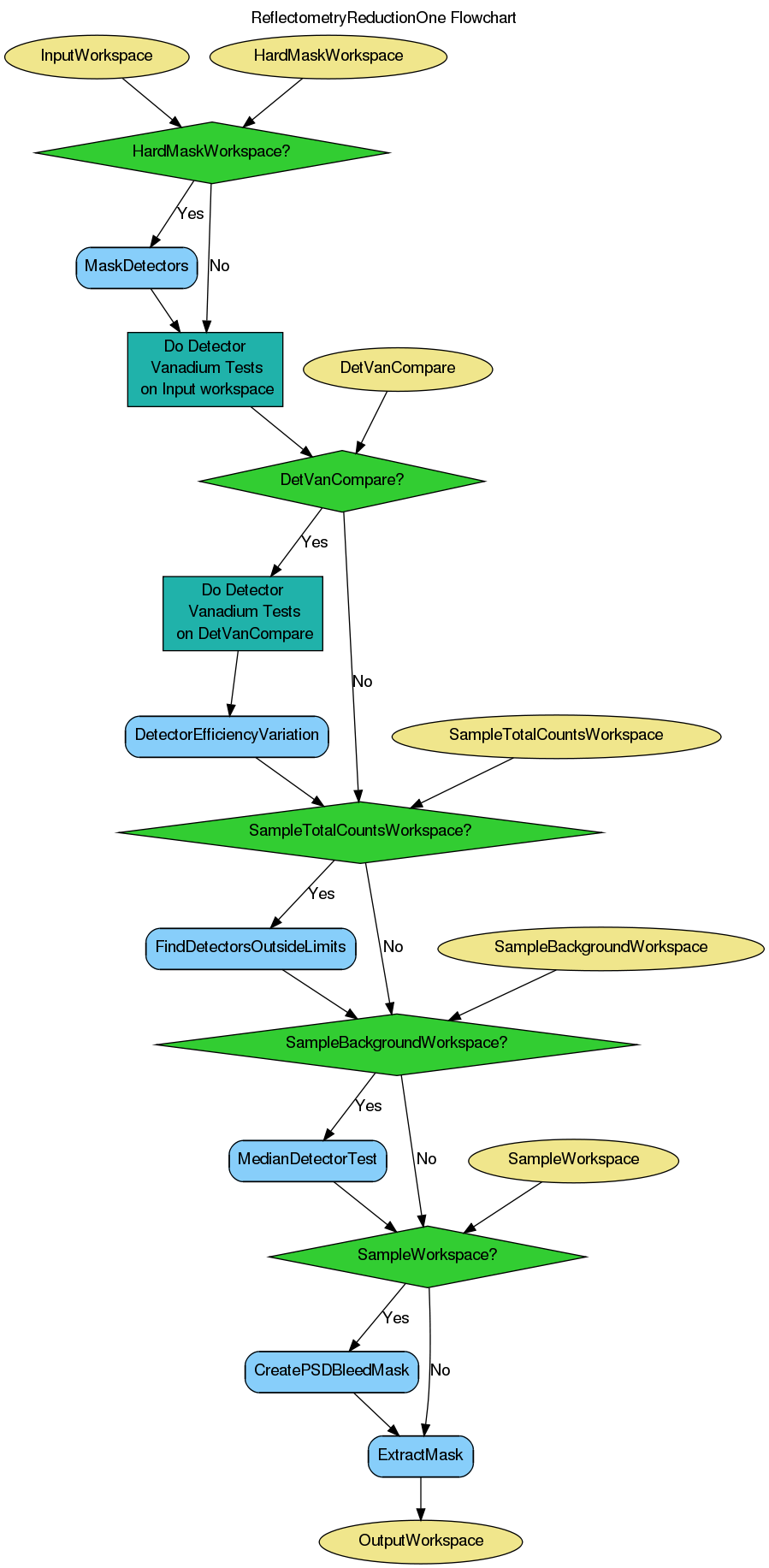Table of Contents
Identifies histograms and their detectors that have total numbers of counts over a user defined maximum or less than the user define minimum.
| Name | Direction | Type | Default | Description |
|---|---|---|---|---|
| InputWorkspace | Input | MatrixWorkspace | Mandatory | Name of the integrated detector vanadium (white beam) workspace. |
| HardMaskWorkspace | Input | MatrixWorkspace | A hard mask to apply to the inputworkspace | |
| OutputWorkspace | Output | MatrixWorkspace | Mandatory | A MaskWorkspace containing the masked spectra as zeroes and ones. |
| StartWorkspaceIndex | Input | number | 0 | The index number of the first spectrum to include in the calculation (default 0) |
| EndWorkspaceIndex | Input | number | Optional | The index number of the last spectrum to include in the calculation (default the last histogram) |
| RangeLower | Input | number | Optional | No bin with a boundary at an x value less than this will be used in the summation that decides if a detector is ‘bad’ (default: the start of each histogram) |
| RangeUpper | Input | number | Optional | No bin with a boundary at an x value higher than this value will be used in the summation that decides if a detector is ‘bad’ (default: the end of each histogram) |
| LowThreshold | Input | number | 0 | Spectra whose total number of counts are equal to or below this value will be marked bad (default 0) |
| HighThreshold | Input | number | Optional | Spectra whose total number of counts are equal to or above this value will be marked bad (default off) |
| LevelsUp | Input | number | 0 | Levels above pixel that will be used to compute the median. If no level is specified, or 0, the median is over the whole instrument. |
| SignificanceTest | Input | number | 0 | Error criterion as a multiple of error bar i.e. to fail the test, the magnitude of the difference with respect to the median value must also exceed this number of error bars |
| LowThresholdFraction | Input | number | 0.1 | Lower acceptable bound as fraction of median value |
| HighThresholdFraction | Input | number | 1.5 | Upper acceptable bound as fraction of median value |
| LowOutlier | Input | number | 0.01 | Lower bound defining outliers as fraction of median value |
| HighOutlier | Input | number | 100 | Upper bound defining outliers as fraction of median value |
| CorrectForSolidAngle | Input | boolean | False | Flag to correct for solid angle efficiency. False by default. |
| ExcludeZeroesFromMedian | Input | boolean | False | If false (default) zeroes will be included in the median calculation, otherwise they will not be included but they will be left unmasked |
| DetVanCompare | Input | MatrixWorkspace | Name of a matching second detector vanadium run from the same instrument. It must be treated in the same manner as the input detector vanadium. | |
| DetVanRatioVariation | Input | number | 1.1 | Identify spectra whose total number of counts has changed by more than this factor of the median change between the two input workspaces |
| SampleTotalCountsWorkspace | Input | MatrixWorkspace | A sample workspace integrated over the full axis range. | |
| SampleBackgroundWorkspace | Input | MatrixWorkspace | A sample workspace integrated over the background region. | |
| SampleBkgLowAcceptanceFactor | Input | number | 0 | Low threshold for the background check MedianDetectorTest. |
| SampleBkgHighAcceptanceFactor | Input | number | 5 | High threshold for the background check MedianDetectorTest. |
| SampleBkgSignificanceTest | Input | number | 3.3 | Error criterion as a multiple of error bar i.e. to fail the test, the magnitude of the difference with respect to the median value must also exceed this number of error bars |
| SampleCorrectForSolidAngle | Input | boolean | False | Flag to correct for solid angle efficiency for background check MedianDetectorTest. False by default. |
| SampleWorkspace | Input | MatrixWorkspace | A sample workspace. This is used in the PSD Bleed calculation. | |
| MaxTubeFramerate | Input | number | 0 | The maximum rate allowed for a tube in counts/us/frame. |
| NIgnoredCentralPixels | Input | number | 80 | The number of pixels about the centre to ignore. |
| NumberOfFailures | Output | number |
This algorithm is a C++ replacement for the Python diagnostics.diagnose function located in the scripts/inelastic directory. The algorithm expects processed workspaces as input just as the other function did. The main functionality of the algorithm is to determine issues with detector vanadium runs and mask out bad pixels. The algorithms that are run on the detector vanadium are FindDetectorsOutsideLimits v1 and MedianDetectorTest v1. It also performs a second set of diagnostics on another detector vanadium run and DetectorEfficiencyVariation v1 on the two. The algorithm also checks processed sample workspaces (total counts and background) for bad pixels as well. The total counts workspace is tested with FindDetectorsOutsideLimits v1. The background workspace is run through MedianDetectorTest v1. A processed sample workspace can be given to perform and CreatePSDBleedMask v1 will be run on it.
Parameters for the child algorithms are not shown due to the sheer number. They are passed onto child algorithms that under the same name, except
Numerous uses of MaskDetectors v1 are not shown and can be taken be be executed whenever appropriate. Also the output property NumberOfFailures from the executed child algorithms are added together to form the NumberOfFailures output by the main algorithm.

Categories: Algorithms | Diagnostics | Workflow | Diagnostics